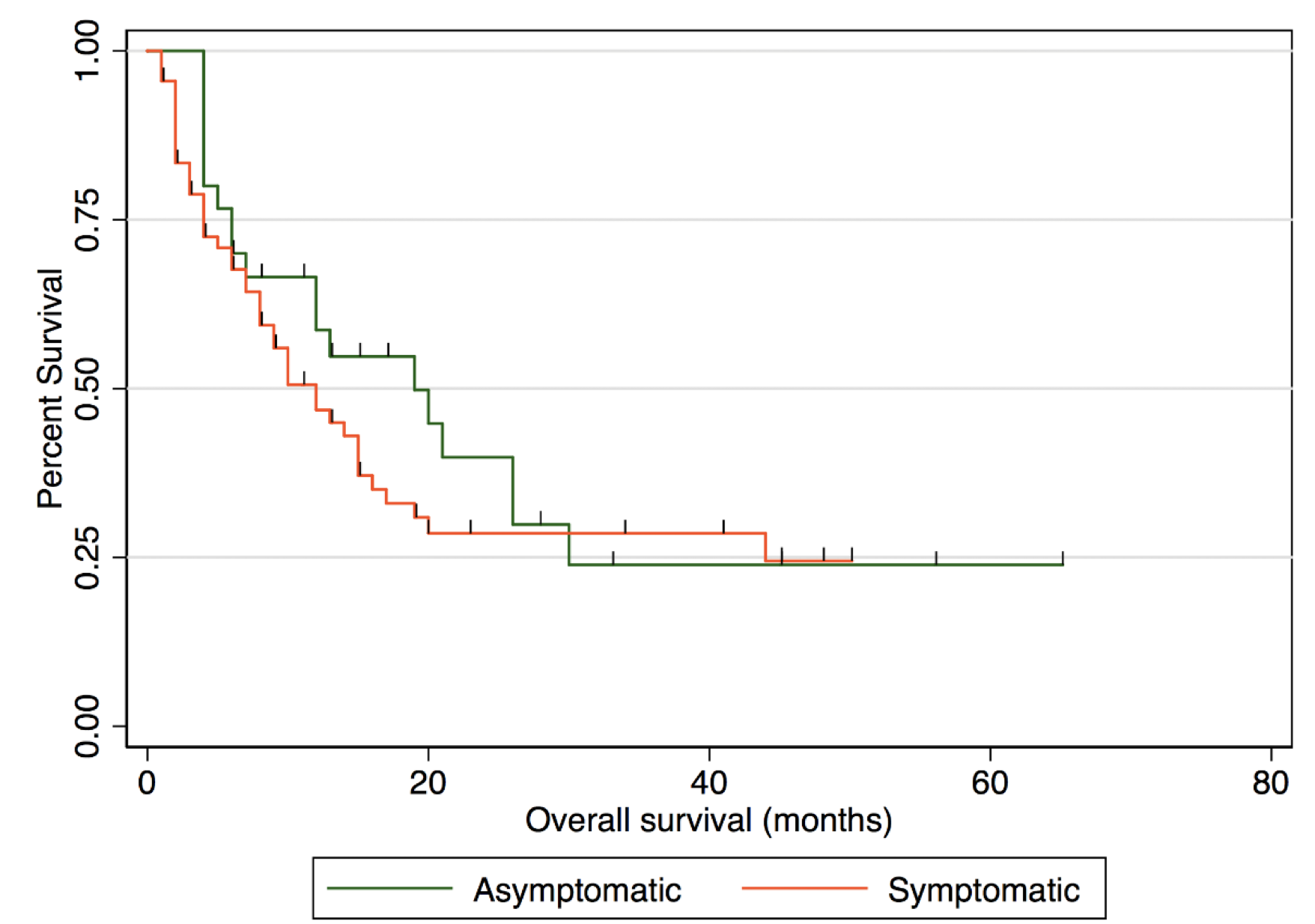Poster Presentation Australasian Melanoma Conference 2018
Symptom status does not impact long-term survival when melanoma brain metastasis receive upfront stereotactic radiotherapy (#123)
Background
Globally, PD-1 with or without CTLA-4 checkpoint inhibitors are increasingly being used as the primary treatment of patients with brain metastasis from metastatic melanoma1. Using immunotherapy, survival outcomes for symptomatic patients are substantially worse than for those who present asymptomatically2,3. We compared the overall survival (OS) of symptomatic and asymptomatic patients when they receive upfront stereotactic radiotherapy (SRT).
Method
This was a retrospective single centre study. All patients had upfront SRT with or without prior surgical resection. Patients were dichotomized into those that were symptomatic or asymptomatic from their intracranial disease at initial presentation. Baseline characteristics of these groups were compared using the Mann-Whitney or Pearson’s chi-squared tests. OS was estimated using the Kaplan-Meier method and groups were compared using a Cox proportional hazards model to control for baseline characteristics.
Results
Between January 2012 and December 2017, 103 patients received SRT prior to systemic treatment. The median age was 64 (range 24 – 88) and most patients were ECOG performance status score 0 (42.2%) or 1 (47.1%). At presentation, 32 patients (31%) were asymptomatic and 71 patients (69%) were symptomatic. More patients in the asymptomatic group were ECOG 0 (58% vs 34%), male (50% vs 32%) and received single-fraction SRT (91% vs 68%). Other baseline characteristics were balanced. The median OS for the entire cohort was 13 months, with 1-, 2- and 4-year OS of 50.5%, 31.9% and 23.5% respectively. Controlling for baseline characteristics, OS (Figure 1) was no different between symptomatic and asymptomatic patients (HR = 1.08 95% CI 0.61 – 1.93 p = 0.79). Both groups showed a plateau in OS after 2 years and the 4-year OS for symptomatic and asymptomatic patients was 24.5% and 23.9% respectively (Figure 1).
Conclusion
Upfront SRT prior to systemic treatment for symptomatic melanoma brain metastasis provides a significant change of long-term survival and this is no different to patients who present asymptomatically. With advances in technology, there are limited clinical circumstances in which SRT cannot be utilized safely.
Figure 1: Overall survival in patients treated with SRT comparing asymptomatic and symptomatic brain metastases

- Glitza Oliva IC, Schvartsman G, Tawbi H, Glitza Oliva IC. Advances in the systemic treatment of melanoma brain metastases. 2018;(May):1509-1520. doi:10.1093/annonc/mdy185/5001428
- Margolin K, Ernstoff MS, Hamid O, et al. Ipilimumab in patients with melanoma and brain metastases: An open-label, phase 2 trial. Lancet Oncol. 2012;13(5):459-465. doi:10.1016/S1470-2045(12)70090-6
- Long G V., Atkinson V, Lo S, et al. Combination nivolumab and ipilimumab or nivolumab alone in melanoma brain metastases: a multicentre randomised phase 2 study. Lancet Oncol. 2018;19(5):672-681. doi:10.1016/S1470-2045(18)30139-6